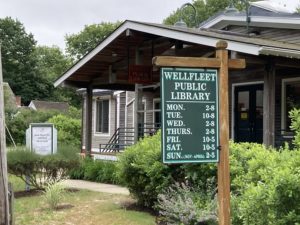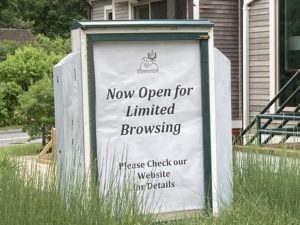The orders from town officials came down suddenly and in quick succession: on March 13, 2020 for Provincetown, on March 14 for Eastham, on March 16 for Wellfleet, and on March 17 for Truro. In less than a week, Covid-19 closed the four public libraries on the Outer Cape, and no one could tell when they would reopen.
Each library has now re-opened partially, on the advice of their towns’ health authorities. Provincetown is following the state’s Covid guidelines, so masks are optional, while the other three libraries all require masks and social distancing. Operating days and hours are restricted and browsing time is limited to 30 minutes. The number of patrons allowed in the buildings at the same time is constrained to maintain distancing rules.
In-house cultural programming will not take place this summer, nor will the two Wellfleet Friends of the Library summer book sales.
Wellfleet Library Director Jennifer Wertkin said that open hours will be expanded in mid-July, but, beyond that, restoration of other services, such as the use of meeting rooms and indoor readings and lectures, is uncertain. Outdoor programming is starting up in Eastham and Truro, but, due to lack of space, Provincetown and Wellfleet do not have that option.
Guidelines for library use can be found on the library websites, which are updated as conditions change.
Beating Hearts
With year-round populations of 5,000 in Eastham, 3,500 in Wellfleet, 3,000 in Provincetown, and only 1,700 in Truro, the public libraries play an outsize role in town life. In addition to their traditional function as resources for reading, the libraries serve as informal community centers; each is the beating heart of the town.
For Debra DeJonker-Berry, director of the Eastham library, it seemed as if the heart had stopped. “The library is a social place,” she said, but for days after the order to close, no one was permitted in the building. A normal pre-Covid Tuesday in summer would see hundreds of people come through the doors.

In Wellfleet, where the library is open on Sundays in winter, providing coffee, cider, doughnuts, and camaraderie along with the Sunday paper, the closure was devastating. “The library is not just about materials, but a place to be,” said Wertkin.
Because the patrons of the Truro library are disproportionately elderly, and broadband internet access in town is uneven, those patrons felt the resulting isolation acutely. Director Tricia Ford agonized for days about not being able to serve the community. But soon, she said, she and her staff organized themselves via telephone and communicated regularly with patrons through the first month before virtual offerings and curbside services could be set up.
The unpredictability of the pandemic’s course hit hard in Provincetown. The earliest to shut down, the Provincetown library reopened for limited service in November 2020. That lasted two weeks before the town detected unacceptable levels of the virus in wastewater. The patrons, observed Director Amy Raff, were disappointed, but they were also “raw, honest, and empathetic.”
When the library reopened for partial service on June 1, there were many small, spontaneous parties in and outside the building. “People want to read the paper,” said Raff, “and to chat with staff.” Some returned with gifts of flowers.
The pandemic-forced shift from direct to virtual interaction, with more of the responsibility falling on patrons, was responsible for what DeJonker-Berry calls “the lemonade of Covid.”
Because of the aging clientele, remote services are increasingly valuable. For those with limited mobility, mastering new technology has enhanced their ability to stay connected to the library. When in-person service fully returns, the connection between library and home will be more seamless.
Curbside services allowing patrons to order materials online and pick them up outside the building have increased library use across the board in Provincetown. The reason, said Raff, is that people don’t have to worry about parking.

In Wellfleet, Wertkin spoke enthusiastically of what she sees as a new embrace of reading among old and new library patrons. Townspeople who let their library cards lapse have reactivated them, and the number of new card applications is growing. More patrons, Wertkin said, “are tired of binge watching, and now they’re binge reading.” A favorite, she noted, is Jane Austen. When toys had to be removed from the library, “kids took out more books,” she said.
Now, with partial service restored to the library, Wertkin is seeing parents and children checking out stacks of books together.
All the directors said the pandemic has led to a level of collaboration that they all had wanted but is now being realized. When the Mass. State Library’s courier service for interlibrary loan curtailed access to books outside each library’s collection, the four town libraries formed their own informal courier service. A couple of times a week, volunteer drivers would shuttle materials among the libraries until the state service resumed.
What of the future? The directors say they have established structures and habits of coordination that will serve the communities better in ordinary times and in future crises. See the “Service” link on the Provincetown website and the “Covid-19 Resources” link on the Wellfleet site for examples of enhanced connections to social services.
